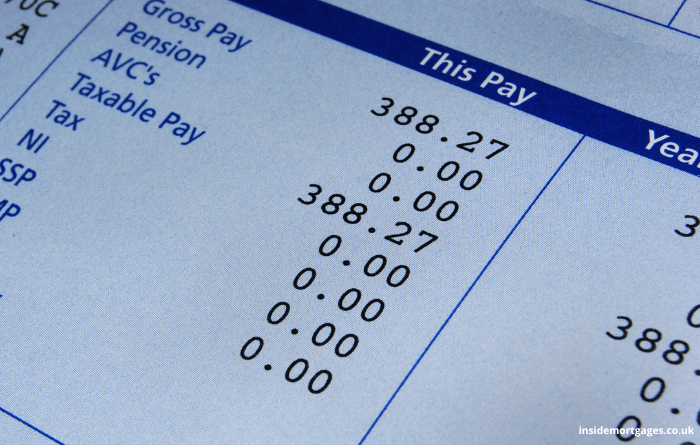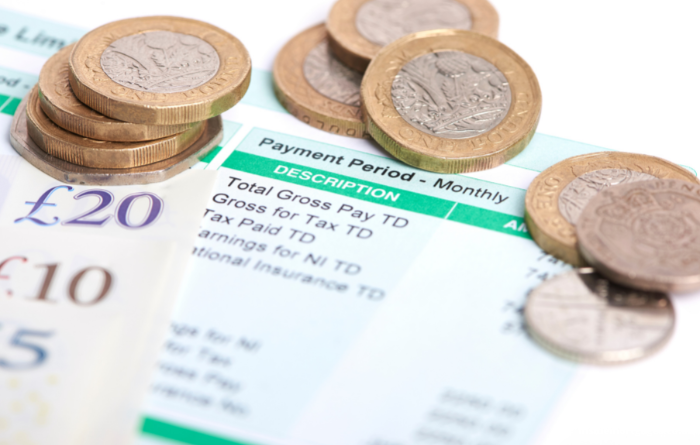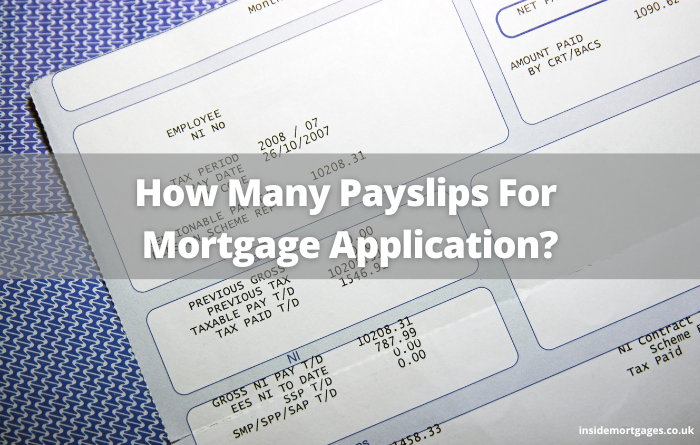How Many Payslips For Mortgage Application?
If you’re looking to apply for a mortgage, you’ll need to provide proof of income. Your lender will want to see your payslips from the last few months to get an idea of your earnings.
So how many payslips do you need to provide for a mortgage? It depends on the lender, but typically they’ll require at least two or three. If you’re self-employed or don’t have wage slips, you may need to provide additional documentation such as tax returns or financial statements to prove your income.
Why Are You Asked For Payslips When Applying For A Mortgage?
Applying for a mortgage is a complex process, and lenders will examine your financial history in order to determine whether or not you are a good candidate for a loan.
One of the documents that lenders will request is your payslip. A payslip provides information about your income, taxes, and other deductions, and it can give lenders insight into your current financial situation.
Lenders will also use payslips to verify your employment status and income level. In addition, payslips can be used to calculate your debt-to-income ratio, which is an important factor in determining whether or not you can afford a mortgage.
So, while it may seem like an unnecessary step in the mortgage application process, requesting payslips from applicants is actually an essential part of assessing their financial history and assessing their ability to repay the loan amount requested.
How Many Payslips Do You Need To Provide?

Applying for a mortgage can be a stressful process, as there are many different factors to consider. One of the most important things to remember is that you will need to provide proof of income in order to qualify for a loan, and for most people this means providing some pay slips.
The number of payslips needed will vary from lender to lender but It will but typically be at least two or three, and even up to six. Whilst this is easy enough for employed applicants to do, if you are self-employed or have other income sources, you may need to provide additional documentation such as tax returns or financial statements.
The best way to determine how many payslips you will need is to speak with a loan officer or mortgage broker. They will be able to review your specific situation and let you know what type of documentation will be required. With their help, you can make sure that you have everything you need to apply for a mortgage and increase your chances of getting approved.
What Else Will You Need To Provide?
Mortgage lenders require a variety of documents from applicants in order to assess their financial history and ability to repay the loan. This means that in addition to your payslips, you’ll also need to provide other documentation when applying for a mortgage.
This typically includes tax returns, bank statements, and proof of employment. Lenders will also pull a credit report to check for any red flags such as missed payments or high levels of debt.
In some cases, borrowers may also need to provide collateral or security for the loan such as a home or car if they are considered to be a high risk applicant by the lender.
By carefully reviewing all of these documents, lenders can get a clear picture of a borrower’s financial situation and decide whether or not to approve the loan.
What Happens If You Don’t Have The Right Number Of Payslips?
If you don’t have the required number of payslips, your lender may ask you to provide alternative documentation or may require that you wait longer before applying for a mortgage. In some cases, they may even reject your application outright.
Lenders typically require at least two recent payslips to assess your ability to repay the loan. If you’re self-employed or have other income sources, you may need to provide additional documentation, such as tax returns or bank statements.
Are There Other Ways To Prove Income Besides Payslips?

If you don’t have payslips, such as for self employed people, there are other ways to prove your income. This may include providing bank statements, tax returns, or other financial documents. If you can’t provide payslips for any reason, you should speak to your lender to see what alternatives they accept.
When you are self-employed, there are a few things that you need to keep in mind when it comes to getting a mortgage. One of the most important is your tax documents. Lenders will want to see at least two years of tax returns in order to verify your income.
If you have been self-employed for less than two years, you may be able to use other documentation, such as profit and loss statements. It is important to keep in mind that your income tax return is not the same as your personal tax return.
Your income tax return includes all of the earnings from your business, while your personal tax return only includes your personal earnings. As a result, it is important to make sure that you provide the lender with the correct tax documentation. Failure to do so could delay the process or even result in the denial of your loan.
Do Employers Have To Provide Wage Slips UK?
- Employers are required to give their employees written pay statements (called wage slips) on or before payday unless they are not an employee or ‘worker’, for example a contractor or freelancer, are in the police service, a merchant seaman, a master or crew member working in share fishing (paid by a share in the profits or gross earnings of a fishing vessel).
By law, wage slips must show:
- your gross pay (the total amount you’re paid before any deductions)
- the amount and type of any deductions from your wages (for example, tax, National Insurance, pension contributions)
- any overtime you’ve worked
- how many hours you worked if you’re paid by the hour
- your pay rate if you’re an hourly worker
- details of other payments made with your wages, for example commissions or bonuses
Your wage slip must be in the form of either a paper document or an electronic statement which can be physically given to you or provided electronically, but they must provide a paper statement if you ask for one.
If an employee has more than one job with the same employer, they should get a separate wage slip for each job. Employers can be fined up to £3,000 by HMRC if they don’t give their employees wage slips.
If your employer does not provide wage slips, you can ask for them. If you do receive wage slips but have misplaced them, you can ask your employer for a copy.
Ways To Get Extra Payslips If You Need Them
If you’re applying for a mortgage and don’t have enough payslips, there are a few things you can do.
- First, check with your employer to see if they can provide additional copies of your payslips. Many employers will be able to do this for you.
- If your employer can’t provide extra payslips, you can try contacting HMRC. They may be able to provide you with a copy of your P60, which will show your earnings for the year.
- Another option is to get a letter from your employer confirming your salary and length of employment. This can be used in lieu of payslips in some cases, but employers should be provided pay slips.
- If you’re self-employed, you’ll need to provide additional documentation to prove your income. This may include tax returns, financial statements, or other documents. You should speak to your lender to see what they require.
Tips For Keeping Payslips Safe And Secure
Whether you receive paper or electronic payslips from your employer, it’s important to keep them safe and secure. Here are some simple tips to help you look after your payslips so that you can easily find them when requested by a mortgage provider.
- Store paper wage slips in a place where they won’t get lost or damaged. A filing cabinet or fire-proof safe is ideal.
- Store electronic payslips in a dedicated folder on your computer or in your emails so you can find them when you need them.
- If your employer shares your payslips on an employee payroll portal, there is always an option to download the wage slip. You may want to do this during your employment or do a bulk download when you leave so that you have a full wage slip history.
- Wage slips contain sensitive information, so be sure to protect them with a password where possible if stored online.
By following these tips, you can ensure that you have the payslips you need when it comes time to apply for a mortgage.
Related Questions
Can I Get A Mortgage If I’m Self-Employed Or On Contract Work?
If you’re self-employed or work on contract, you may not have access to traditional wage slips that are issued to full-time or part-time employees. As such, you may be wondering how you can get a mortgage without being able to provide a wage slip.
Don’t worry, because this isn’t a deal breaker. Your circumstances are fully considered when applying for a mortgage and the documents requested for proof of ID and proof of funds will be tailored to your employment status.
If you are self-employed or work on short-term contracts, you can still get a mortgage, but you will need to provide additional documentation to verify your income. This may include tax returns, financial statements, or other documents.
How To Increase Changes Of Getting Approved For A Mortgage?
If you’re looking to increase your chances of getting approved for a mortgage, there are a few things you can do.
- First, be sure to check your credit score and report for any errors. This is one of the first things lenders will look at when considering your application. If you have a low credit score, you may need to take some time to improve it before applying for a mortgage.
- Another important factor is your employment history. Lenders want to see that you have a stable job and income. If you’ve been employed for a long time with no gaps in employment, this will work in your favour.
- Another thing you can do is to provide a larger down payment. A down payment shows that you have skin in the game and are less likely to default on your loan. This may help you get approved for a mortgage, even if you don’t have perfect credit.
- Finally, try to avoid changing jobs or taking on new debt before applying for a mortgage. Lenders like to see stability, so making any major changes in your life could negatively impact your application.
By following these tips, you can increase your chances of getting approved for a mortgage.
What Are The Different Types Of Mortgage?
There are many different types of mortgage available, each with its own set of benefits and drawbacks.
The most common type of mortgage is a fixed-rate mortgage. With this type of loan, the interest rate is set for the life of the loan, so you know exactly how much your monthly payments will be. This can make budgeting easier and gives you the peace of mind of knowing that your payments won’t go up even if interest rates do.
Another common type of mortgage is an adjustable-rate mortgage (ARM). With an ARM, the interest rate is fixed for a period of time, usually 5 or 7 years, and then adjust annually after that. The advantage of an ARM is that it usually starts with a lower interest rate than a fixed-rate mortgage. However, the downside is that your payments could go up if interest rates increase.
There are also specialised mortgages available, such as government-backed loans like FHA and VA loans. These loans are available to certain homebuyers, such as first-time buyers or those with low incomes. These loans often have more relaxed requirements, such as a lower down payment or credit score.
There are many different types of mortgage available, so it’s important to do your research to find the one that’s right for you.
Summary
The article covers how many payslips for a mortgage application are needed along with the when this might vary and other forms of documentation that can be provided if you don’t have a wage slips such as contract workers or the self employed.
To recap, most people will need to provide 3 months’ worth of payslips as proof of income when applying for a mortgage. However, if you are self-employed or work on short-term contracts, you may need to provide additional documentation to verify your income. This may include tax returns, financial statements, or other documents.
Applying for a mortgage can be a complex process, but it doesn’t have to be overwhelming. By understanding what documents you’ll need to provide and why, as well as getting them ready ahead of time, you can make the process of becoming a homeowner go as smoothly as possible.

